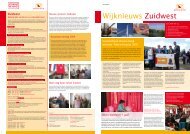freakonomics
freakonomics
freakonomics
You also want an ePaper? Increase the reach of your titles
YUMPU automatically turns print PDFs into web optimized ePapers that Google loves.
Doesn’t: The child attended Head Start.<br />
A child who had a low birthweight tends to do poorly in school. It may be that being born<br />
prematurely is simply hurtful to a child’s over-all well-being. It may also be that low<br />
birthweight is a strong forecaster of poor parenting, since a mother who smokes or drinks<br />
or otherwise mistreats her baby in utero isn’t likely to turn things around just because the<br />
baby is born. A low-birthweight child, in turn, is more likely to be a poor child—and,<br />
therefore, more likely to attend Head Start, the federal preschool program. But according<br />
to the ECLS data, Head Start does nothing for a child’s future test scores. Despite a deep<br />
reservoir of appreciation for Head Start (one of this book’s authors was a charter student),<br />
we must acknowledge that it has repeatedly been proven ineffectual. Here’s a likely<br />
reason: instead of spending the day with his own undereducated, overworked mother, the<br />
typical Head Start child spends the day with someone else’s undereducated, overworked<br />
mother. (And a whole roomful of similarly needy children.) As it happens, fewer than 30<br />
percent of Head Start teachers have even a bachelor’s degree. And the job pays so<br />
poorly—about $21,000 for a Head Start teacher versus $40,000 for the average publicschool<br />
kindergarten teacher—that it is unlikely to attract better teachers any time soon.<br />
Matters: The child’s parents speak English in the home.<br />
Doesn’t: The child’s parents regularly take him to museums.<br />
A child with English-speaking parents does better in school than one whose parents don’t<br />
speak English. Again, not much of a surprise. This correlation is further supported by the<br />
performance of Hispanic students in the ECLS study. As a group, Hispanic students test<br />
poorly; they are also disproportionately likely to have non-English-speaking parents.<br />
(They do, however, tend to catch up with their peers in later grades.) So how about the<br />
opposite case: what if a mother and father are not only proficient in English but spend<br />
their weekends broadening their child’s cultural horizons by taking him to museums?<br />
Sorry. Culture cramming may be a foundational belief of obsessive parenting, but the<br />
ECLS data show no correlation between museum visits and test scores.<br />
Matters: The child is adopted.<br />
Doesn’t: The child is regularly spanked.









